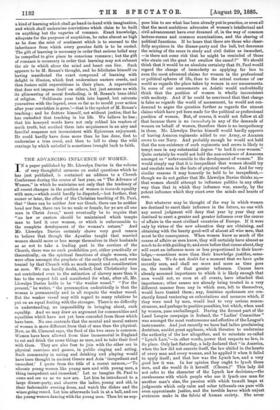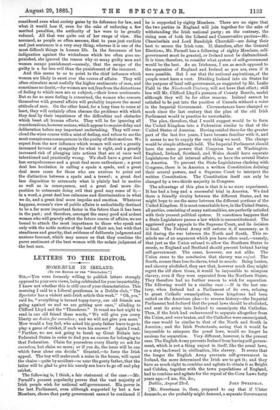THE ADVANCING INFLUENCE OF WOMEN.
IN a paper published by Mr. Llewelyn Davies in the volume of very thoughtful sermons on social questions which he has just published, is contained an address to a Church Conference during the course of last year, on " The Advance of Women," in which he maintains not only that the tendency of all recent changes in the position of women is towards equality with men,—which could hardly be disputed,—but further, that sooner or later, the effect of the Christian teaching of St. Paul, that " there can be neither Jew nor Greek, there can be neither bond nor free, there can be no male or female, for ye are all one man in Christ Jesus," must eventually be to require that " no law or custom should be maintained which tempts man to lord it over women, or which is unfavourable to the complete development of the woman's nature." And Mr. Llewelyn Davies certainly shows very good reason to believe that though the Apostles taught that married women should more or less merge themselves in their husbands so as not to take a leading part in the services of the Church, there was no such prohibition put, either practically or -theoretically, on the spiritual functions of single women, who were often amongst the prophets of the early Church, and were treated by that Church with as much respect and consideration as men. We can hardly doubt, indeed, that Christianity has not contributed even to the extinction of slavery more than it has to the respect felt and manifested for what, after all, Mr. Llewelyn Davies holds to be " the weaker vessel." " For the present," he writes, " the presumption undoubtedly is that the woman is permanently and in all respects the weaker vessel.
• Bat the weaker vessel may with regard to many relations be put on an equal footing with the stronger. There is no difficulty in understanding, no impossibility in bringing about, such -equality. And we may draw an argument for communities and equalities which have not yet been conceded from those which have been. No one contends that the mental and moral nature of woman is more different from that of man than the physical. Now, as St. Clement says, the food of the two sexes is common. Women have been allowed from time immemorial in England to eat and drink the same things as men, and to take their food with them. They are also free to join with the other sex in physical exercises and games, in public singing and acting. Such community in eating and drinking and playing would have been thought in ancient Greece and Asia inexpedient and immodest.' I quote from the title of a recent sermon,—' To educate young women like young men and with young men, a thing inexpedient and immodest.' Let us imagine St. Paul to come and see us as we now are. Let him be introduced to a large dinner-party, and observe the ladies, young and old, in their fashionable evening dress, and watch the dishes and the wines going round. Let him afterwards look in at a ball, and see the young women dancing with the young men. Then let us sup- pose him to see what has been already put in practice, or even all that the most ambitions advocates of women's intellectual and civil advancement have ever dreamed of, in the way of common lecture-rooms and common examinations, and the sharing of political functions. If he hears that there are those who cheer- fully acquiesce in the dinner-party and the ball, but denounce the mixing of the sexes in study and civil duties as immodest, —is there not some risk that he might be reminded of those who strain out the gnat but swallow the camel ?" We should think that it would be an absolute certainty that St. Paul would regard the charge of immodesty as applying far less to even the most advanced claims for women in the professional or political spheres of life, than to the actual customs of our world as regards the place taken by women in our amusements. In some of our amusements an Asiatic would undoubtedly think that the position of women is wholly inconsistent with modesty. And if he could be convinced that that charge is false as regards the world of amusement, he would not con- descend to argue the question further as regards the utmost claims which have yet been made for the political or professional position of women. But, of course, it would not follow at all that because there is no immodesty in any of the demands of women on behalf of women, therefore there is no inexpediency in them. Mr. Llewelyn Davies himself would hardly approve of having Amazon regiments added to our Army, or Amazon crews to our Navy. And probably enough he would not hold that the non-existence of such regiments and crews is likely to tempt men in any substantial degree "to lord it over women." Quite certainly he would not hold the non-existence of Amazons amongst us " unfavourable to the development of women." He would simply say that it is inexpedient that women should try and emulate men in the feats of physical warfare. And for very similar reasons it may honestly be held to be inexpedient,— though we do not gather that Mr. Llewelyn Davies thinks so,— that women should attempt to influence politics in any other way than that in which they influence war, namely, by the potent influence which they exert over the minds and hearts of men.
But whatever may be thought of the way in which women are destined to exert their influence in the future, no one with any sound judgment will deny that year by year they are destined to exert a greater and greater influence over the course of affairs in the most civilised countries of Europe. If it were only by virtue of the new education they are obtaining, and obtaining with the hearty good-will of almost all wise men, that must be the consequence. When women know as much of the course of affairs as men know, they will certainly have almost as much to do with guiding it; and even before that comes about, they will exert an influence more or less proportioned to their know- ledge,—sometimes more than their knowledge justifies, some- times less. We do not doubt for a moment that we have quite recently seen, and shall see more and more as time goes on, the results of that greater influence. Causes have already assumed importance to which it is likely enough that men would not, so soon at all events, have attached that importance; other causes are already being treated in a very different manner from any in which men, left to themselves, would have treated them; nay, feminine spokesmen are con- stantly found venturing on exhortations and menaces which, if they were used by men, would lead to very serionc remon- strances, and perhaps to positive penalties, but which, when used by women, pass unchallenged. During the fiercest part of the Land League campaign in Ireland, the "Ladies' Committee " was amongst the most venturesome and effective of the League's instruments. And just recently we have had ladies proclaiming doctrines, amidst great applause, which threaten to undermine the authority of the law altogether, and to reinstate so-called "Lynch Law,"—in other words, power that respects no law, in its place. Only last Saturday, a lady declared that " in America, when the law did not execute itself, the law abided in the hearts of every man and every woman, and he applied it when it failed to apply itself; and that law was the Lynch law, and a very good law it was. In her opinion they ought to lynch those men, and she would do it herself. (Cheers.)" This lady did not refer to the character of the Lynch law decisions,—the carelessness with which people who use it lynch one man for another man's sins, the passion with which tumult leaps at judgments which only calm and sober tribunals can pass with even approximate justice, and the terrible havoc which unjust sentences make in the fabric of human society. She never
considered even what society gains by its deference for law, and what it would lose if, even for the sake of enforcing a few merited penalties, the authority of law were to be greatly reduced. All that was quite out of her range of view. She assumed, as people so often assume, that to pass just verdicts and just sentences is a very easy thing, whereas it is one of the most difficult things in human life. In the fierceness of her indignation against the wickedness which too often goes un- punished, she ignored the reason why so many guilty men and women escape punishment—namely, that the escape of the guilty is a far less evil than the punishment of the innocent.
And this seems to us to point to the chief influence which women are likely to exert over the course of affairs. They will often stimulate most usefully the higher sentiments of men, and sometimes no doubt,—for women are not:free from the distortions of feeling to which men are so subject,—their lower sentiments. But so far as mere feeling is concerned, the women who concern themselves with general affairs will probably improve the moral attitude of men. On the other hand, for a long time to come at least, they will certainly often obscure the problems with which they deal by their impatience of the difficulties and obstacles which beset all human efforts. They will be for ignoring all oonsiderations, however serious, which appear to require delay and deliberation before any important undertaking. They will over- cloud the wiser course with a mist of feeling, and refuse to see the most conspicuous consequences in the purity of their motives. We -expect from the new influence which women will exert a greatly increased fervour of sympathy for what is right, and a greatly increased risk of plunging into actions that are at once well intentioned and practically wrong. We shall have a great deal less scrupulousness and a great deal more enthusiasm ; a great deal less hesitation in calling a spade a spade, and a great deal more scorn for those who are anxious to point out the distinction between a spade and a trowel ; a great deal less disposition to extenuate what is plainly bad in motive as well as in consequence, and a great deal more dis- position to extenuate doing evil that good may come of it,— in a word, a great deal less calmness and discrimination in what we do, and a great deal more impulse and emotion. Whatever happens, women's view of public affairs is undoubtedly destined to be a far more important factor in the future than it has been in the past ; and therefore, amongst the many good and ardent women who will gravely affect the future course of affairs, we are bound to attach the most importance to those who speak not only with the noble motive of the best of their sex, but with that steadiness and gravity, that evidence of deliberate judgment and anxious forecast, which may assure us that they combine the purer sentiment of the best women with the sedate judgment of 'the best men.



































 Previous page
Previous page